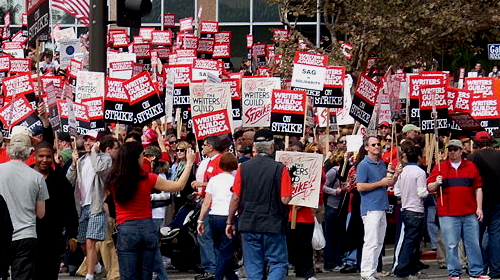Strike Alert: Possible Upcoming WGA Strike

By Olivia Grady
On April 4, 2017, the Writers Guild of America (WGA), a labor union representing film, television, radio and other media writers, sent a letter by Executive Director David Young to media buyers. In the letter, it announced that writers would go on strike on May 2, 2017:
With the cable networks’ Upfronts underway and the broadcast networks’ Upfronts beginning in May, I am writing to inform you of a potential labor dispute that could have a significant impact on primetime programming for the 2017-2018 television season. As a stakeholder that may be negatively affected by this dispute, this information may be relevant to your media buying plans.
The guild is demanding a $178 million per year deal with the Alliance of Motion Picture and Television Producers, a trade organization that represents over 350 American film and television producers including CBS, Paramount Pictures and the Walt Disney Company. The union also wants the Guild’s Health Plan to be bailed out because it will likely face $145 million in deficits over the next four years.
The current contract is set to expire on May 1st.
The first talks between the union and the Guild started on March 13, but were stopped on March 24th. Both sides claimed it was the fault of the other side.
On April 10th, contract negotiations resumed between the union and producers and will continue until the end of this week. On Friday, however, the union will conduct a strike authorization vote.
Jonathan Handel, an entertainment and technology lawyer at TroyGould, does not believe there is enough time to negotiate a new contract before the strike because the writers are asking for three times what the studio would likely agree to. The late-night shows, soap operas and sitcoms will likely be cut first.
The last big strike that the Guild had was the 2007 – 2008 strike. 12,000 screenwriters and TV writers were on strike from November 5, 2007 to February 12, 2008. The strike targeted the producers’ Alliance, but a new deal was approved on February 10th. Over 92 percent of the strikers voted to end the strike on February 12th, and over 93 percent ratified the new contract on February 26th.
The strike cost the economy over $2 billion, according to a Milken Institute (a think tank that works to increase global prosperity) report.
Were the writers successful?
They were successful in part. They did manage to receive some of the digital revenues after the strike ended. However, the strike did make the producers think about whether they needed all of the writers, and that hurt the writers in the short term. This meant there were fewer contracts with writers and more reality TV.
Interestingly, in the current letter, the 2007-2008 strike was cited, explaining the benefits of the strike to writers:
Pointing to the 2007-08 strike, the Guild’s letter emphasized that "[t]he loss of original programming had a significant impact on ratings," citing double-digit declines and the fact that one network, NBC, was forced as a result "to return money to advertisers rather than offer make-goods," or substitute advertising opportunities.
The Center for Worker Freedom will continue to monitor this story.





